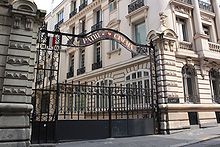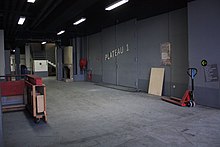La fémis
| La Fémis | |
|---|---|

|
|
| founding | 1986 (predecessor: IDHEC , founded 1943) |
| place | Paris |
| state | Ile-de-France |
| country | France |
| president | Raoul Peck |
| Website | femis.fr |
La Fémis (Fondation européenne des métiers de l'image et du son , previously École Nationale Supérieure des métiers de l'image et du son , German: National College of Image and Sound) in Paris is the largest and most important film school in France .
history
The film school La Fémis is considered to be the successor to the Institut des hautes études cinématographiques (IDHEC). The IDHEC was founded in 1943 by the composer Yves Baudrier , who taught there from 1945 to 1965 and offered three years of professional studies (including directing and editing). Among the graduates of IDHEC were well-known directors such as Louis Malle , Jean-Jacques Annaud , Claude Miller , Claude Sautet and Volker Schlöndorff .
The École Nationale Supérieure des métiers de l'image et du son was founded in 1986. Since 1999, the film school has been based in the former Rapid Films - Pathé studios on Rue Francoeur on Montmartre , where famous filmmakers such as Jean Renoir , Marcel Carné , Jean Cocteau and Jean-Jacques Annaud made their films. The studio was created in 1926 by the important French film producer Bernard Natan, who was deported as a Jew under the Vichy regime in 1942 . In 1997, Yves Lion's architecture firm won the reconstruction competition.
By regulation number 98–371 of May 13th, 1998, La Fémis is a public-sector economic enterprise subordinate to the Ministry of Culture and Communication (ministère de la Culture et de la communication). The director of the film school is currently Marc Nicolas , the office of president is Raoul Peck .
The four important "missions" of the university are:
- Initial and further training
- Cooperation and exchange with film schools abroad
- Production, output and distribution of films and documents relating to school education
- Promotion and dissemination of film culture
Furnishing
The students work under professional conditions and have material, equipment and spaces adapted to the developments in cinematographic and audiovisual production. The film school has four studios for making films, 30 editing rooms, three auditoriums, a sound studio, three projection halls with 20, 70 and 170 seats each, and video and film equipment ( DTS audio format ).
The film school also offers a carpentry workshop, a studio for film sets, ten classrooms that have been equipped with audiovisual materials and computers, a photo laboratory, two material rooms, storage rooms for lighting technology, cameras and sound, beta video cameras, DV cameras and camera films in the formats 16, Super 16 and 35 mm.
education
The school is accessible to students via a selective selection process in which the candidate may not participate more than three times. On average, one in twenty-five applicants is admitted to a university. In the directing area, there are 85 applicants for each study place. The exams, like the lessons, are held in French. La Fémis has partnerships and exchange agreements etc. a. with Columbia University in New York, the California Institute of the Arts and the film schools in London, Buenos Aires, Tokyo as well as with a Swiss film school (Lausanne) and the Baden-Württemberg Film Academy in Ludwigsburg.
Initial training
While the École Louis Lumière chooses a technical focus, the lessons at La Fémis are considered to be versatile, as they are partly based on division of labor and interdisciplinary. French students applying to study at the film school must have a state diploma or a comparable educational qualification and must not be over the age of 27. Applicants from the European Union or abroad must have an equivalent level of education. Applicants with a high school diploma and at least four years of professional experience are also qualified for the selection process. The command of the French language is mandatory. The multi-day exams and lessons are held in French. The initial training offered consists of a main course that is divided into seven subject areas: film production , screenwriting , directing , camera work, sound engineering, production design and editing. The duration of the course is 39 months and is divided into three stages.
First stage
The first stage ( cycle 1 ) is a collaborative study. a. the film analysis, production and profitability of the cinema, a video exercise of three minutes in length and the creation of a 16 mm film . All students should participate in the first stage of their studies in all areas of production, from pre- production to post-production . An internship in a company is also planned.
Second step
The second stage ( Cycle 2 ) lasts around eighteen months, is divided into two phases and provides each department with its own specialized training. Each student should be made familiar with the tools of the craft that they choose. In the course of this level, each department organizes its own lessons and the exercises either cover one or more departments, such as B. Script (short or long film, dramaturgy, roles), editing (exercises on short or long films in 16 and 35 mm film format ) and camera work (including film lighting technology, work with the Steadicam ). Through the exercises, the students should develop more independence and be able to develop their creativity freely. During this phase, a series of internships of more or less length are to be completed by subject area, in France or abroad, through which the students will gain more work experience.
Third step
The third stage (cycle 3) is dedicated to the students' personal research. The students from the directing department realize a film that is produced by a student from the film production department and students from other departments such as production design, camera work or editing participate. In addition, there is the realization of a personal project, such as B. Editing a film based on archive material or a documentary film, working on a test film, designing a decor or facility, or writing a script for a feature film. The training at the university ends with the achievement of the diploma (level 1, Bac +5), in which all exercises carried out during the course are assessed.
Other courses
Course of study rental and evaluation
Since September 2003, the film school offers La Fémis the degree program distribution and exhibition (Distribution Exploitation) at. The study program was designed in cooperation with the experts and representatives of the professional associations in the field and combines theoretical lessons with practical work. The places in the 16-month course are awarded through a selection process aimed at second-level students under 27 years of age (at least Bac +3), or specialists from the field who have not yet reached the age of thirty, with a high school diploma and have at least four years of professional experience. The training is divided into three phases and concludes with the achievement of the diploma.
Screenwriting degree
The scriptwriting course lasts twenty-four months and is divided into three phases. It is partly based on the first level of initial training. In addition to film analysis, editing and camera work, the training also includes drawing courses for the subsequent creation of storyboards , lessons for writing scripts for short and feature-length films and organization. In addition, the students should be able to gain work experience through internships (e.g. in a television editorial office).
The Ludwigsburg-Paris studio
The Atelier Ludwigsburg-Paris is a Franco-German one-year training program for young European film producers in the areas of story development , production , marketing and sales in a European and international context. The studio is carried out jointly by the Baden-Württemberg Film Academy in Ludwigsburg and La Fémis . The director of studies on the German side is Peter Sehr .
- Main article: Atelier Ludwigsburg-Paris
L'université d'été
The L'université d'été (English Summer University) at La Fémis is a program organized in partnership with the Ministry of Foreign Affairs ( Ministère des Affaires étrangères ). It is limited to a period of two months and is aimed at documentary film. It offers twelve interns, young film students or other filmmakers from the Maghreb , Africa , Latin America , Asia (with the exception of Korea , Japan and Singapore ), Central and Eastern Europe with the exception of the countries of the European Union and the Middle East the opportunity to practice their practical and to deepen theoretical knowledge about cinema. The aim of the summer university is that each participant realizes a five-minute documentary, whereby the command of the French language is mandatory. Participants will be selected by the Ministry of Foreign Affairs and the Film School on the basis of the application documents available at the French embassies in the countries covered by this curriculum.
Professors
The heads of the departments and courses at La Fémis (as of April 2006):
- Directed by Jean-Paul Civeyrac , Michka Gorki and Claire Simon
- Film production: Jacqueline Borne and Alain Rocca
- Sound: Jean-Pierre Laforce , Stéphane Thiebaut and Matthieu Fichet (assistant)
- Camera work: Jean-Jacques Bouhon and Pierre-William Glenn
- Editing: Jacques Comets and Catherine Zins
- Script: Marie-Geneviève Ripeau and Yves Thomas
- Production design: Benoît Barouh , Michel Barthelemy and Alexandre Tsékénis (assistant)
- Film analysis: Alain Bergala
- Screenplay (scripts): Sylvette Baudrot and Zoé Zurstrassen
- Distribution and operation: Jean-Baptiste Diéras , Dominique Erenfrid and Jean-Michel Rey
Graduates
In more than 20 years, La Fémis has trained over 600 filmmakers. A selection of the most famous graduates of the film school and its predecessor, the Institut des hautes études cinématographiques (IDHEC):
Directors
- Merzak Allouache
- Omar Amiralay
- Solveig Anspach
- Emmanuelle Bercot
- Jeanne Biras
- Noël Burch
- Yves Caumon
- Alain Corneau
- Josée Dayan
- Claire Denis (Professor at La Fémis )
- Arnaud Desplechin
- Vincent Dieutre
- Peter Fleischmann
- Christophe Goose
- Dolphins Gleize
- Jean Grémillon
- Lucile Hadzihalilovic
- Gérard Krawczyk
- Patrice Leconte
- Noémie Lvovsky
- Louis Malle
- Laetitia Masson
- Claude Miller (later professor at La Fémis )
- Orso Miret
- Dominik Moll
- Emmanuel Mouret
- Idrissa Ouédraogo
- François Ozon
- Rithy Panh
- Alain Resnais
- Claude Sautet
- Volker Schlöndorff
- Johan van der Keuken
- François Weyergans
- Andrzej Żuławski
Film editors
Film producers
Production designer
Sound designer
- Pierre Excoffier (later professor at La Fémis )
literature
- Micheline Daguinot: Annuaire des anciens élèves: 1986–1999: les dix premières promotions . Fémis, Paris 2000, ISBN 2-907114-32-8 (French edition)
Web links
- femis.fr - Official website (French)

